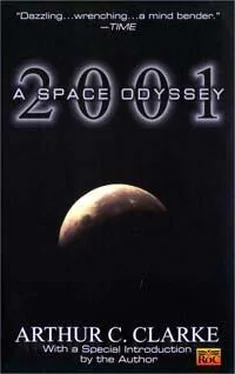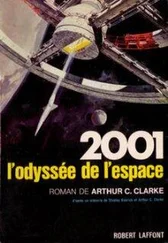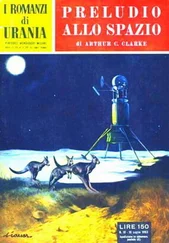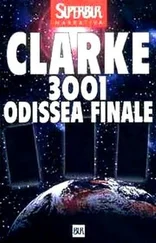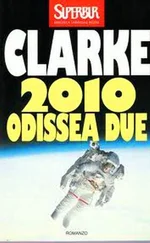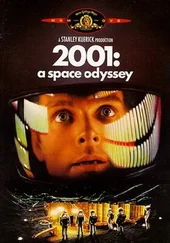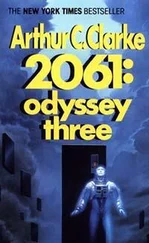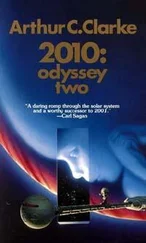As the light grew swiftly around them, and the shrunken Sun lifted once more into the Jovian sky, Poole and Bowman reached out silently and shook each other's hands.
Though they could hardly believe it, the first part of the mission was safely over.
20 – The World of the Gods
But they had not yet finished with Jupiter. Far behind, the two probes that Discovery had launched were making contact with the atmosphere.
One was never heard from again; presumably it made too steep an entry, and burned up before it could send any information. The second was more successful; it sliced though the upper layers of the Jovian atmosphere, then skimmed out once more into space. As had been planned, it had lost so much speed by the encounter that it fell back again along a great ellipse. Two hours later, it reentered atmosphere on the daylight side of the planet – moving at seventy thousand miles an hour.
Immediately, it was wrapped in an envelope of incandescent gas, and radio contact was lost. There were anxious minutes of waiting, then, for the two watchers on the control deck. They could not be certain that the probe would survive, and that the protective ceramic shield would not burn completely away before braking had finished. If that happened, the instruments would be vaporized in a fraction of a second.
But the shield held long enough for the glowing meteor to come to rest. The charred fragments were jettisoned, the robot thrust out its antennas and began to peer around with its electronic senses. Aboard Discovery, now almost a quarter of a million miles away, the radio started to bring in the first authentic news from Jupiter.
The thousands of pulses pouring in every second were reporting atmospheric composition, pressure, temperature, magnetic fields, radioactivity, and dozens of other factors which only the experts on Earth could unravel. However, there was one message that could be understood instantly; it was the TV picture, in full color, sent back by the falling probe.
The first views came when the robot had already entered the atmosphere, and had discarded its protective shell. All that was visible was a yellow mist, flecked with patches of scarlet which moved past the camera at a dizzying rate – streaming upwards as the probe fell at several hundred miles an hour.
The mist grew thicker; it was impossible to guess whether the camera was seeing for ten inches or ten miles, because there were no details on which the eye could focus. It seemed that, as far as the TV system was concerned, the mission was a failure. The equipment had worked, but there was nothing to see in this foggy, turbulent atmosphere.
And then, quite abruptly, the mist vanished. The probe must have fallen through the base of a high layer of cloud, and come out into a clear zone – perhaps a region of almost pure hydrogen with only a sparse scattering of ammonia crystals. Though it was still quite impossible to judge the scale of the picture, the camera was obviously seeing for miles.
The scene was so alien that for a moment it was almost meaningless to eyes accustomed to the colors and shapes of Earth. Far, far below lay an endless sea of mottled gold, scarred with parallel ridges that might have been the crests of gigantic waves. But there was no movement; the scale of the scene was too immense to show it. And that golden vista could not possibly have been an ocean, for it was still high in the Jovian atmosphere. It could only have been another layer of cloud.
Then the camera caught, tantalizingly blurred by distance, a glimpse of something very strange. Many miles away, the golden landscape reared itself into a curiously symmetrical cone, like a volcanic mountain. Around the summit of that cone was a halo of small, puffy clouds – all about the same size, all quite distinct and isolated. There was something disturbing and unnatural about them – if, indeed, the word "natural" could ever be applied to this awesome panorama.
Then, caught by some turbulence in the rapidly thickening atmosphere, the probe twisted around to another quarter of the horizon, and for a few seconds the screen showed nothing but a golden blur. Presently it stabilized; the "sea" was much closer, but as enigmatic as ever. One could now observe that it was interrupted here and there with patches of darkness, which might have been holes or gaps leading to still deeper layers of the atmosphere.
The probe was destined never to reach them. Every mile, the density of the gas around it had been doubling, the pressure mounting as it sank deeper and deeper toward the hidden surface of the planet. It was still high above that mysterious sea when the picture gave one premonitory flicker, then vanished, as the first explorer from Earth crumpled beneath the weight of the miles of atmosphere above it.
It had given, in its brief life, a glimpse of perhaps one millionth of Jupiter, and had barely approached the planet's surface, hundreds of miles down in the deepening mists. When the picture faded from the screen, Bowman and Poole could only sit in silence, turning the same thought over in their minds.
The ancients had, indeed, done better than they knew when they named this world after the lord of all the gods. If there was life down there, how long would it take even to locate it? And after that, how many centuries before men could follow this first pioneer – in what kind of ship?
But these matters were now no concern of Discovery and her crew. Their goal was a still stranger world, almost twice as far from the Sun – across another half billion miles of comet-haunted emptiness.
The familiar strains of "Happy Birthday," hurled across seven hundred million miles of space at the velocity of light, died away among the vision screens and instrumentation of the control deck. The Poole family, grouped rather self-consciously round the birthday cake on Earth, lapsed into a sudden silence.
Then Mr. Poole, Senior, said gruffly: "Well, Frank, can't think of anything else to say at the moment, except that our thoughts are with you, and we're wishing you the happiest of birthdays."
"Take care, darling," Mrs. Poole interjected tearfully. "God bless you."
There was a chorus of "good-byes," and the vision screen went blank. How strange to think, Poole told himself, that all this had happened more than an hour ago; by now his family would have dispersed again and its members would be miles from home. But in a way that time lag, though it could be frustrating, was also a blessing in disguise. Like every man of his age, Poole took it for granted that he could talk instantly, to anyone on Earth, whenever he pleased. Now that this was no longer true, the psychological impact was profound. He had moved into a new dimension of remoteness, and almost all emotional links had been stretched beyond the yield point.
"Sorry to interrupt the festivities," said Hal, "but we have a problem."
"What is it?" Bowman and Poole asked simultaneously.
"I am having difficulty in maintaining contact with Earth. The trouble is in the AE-35 unit. My Fault Prediction Center reports that it may fail within seventy-two hours."
"We'll take care of it," Bowman replied. "Let's see the optical alignment."
"Here it is, Dave. It's still O.K. at the moment."
On the display screen appeared a perfect half-moon, very brilliant against a background almost free of stars. It was covered with clouds, and showed not one geographical feature that could be recognized. Indeed, at first glance it could be easily mistaken for Venus.
But not at a second one, for there beside it was the real Moon which Venus did not possess – a quarter the size of Earth, and in exactly the same phase. It was easy to imagine that the two bodies were mother and child, as many astronomers had believed, before the evidence of the lunar rocks had proved beyond doubt that the Moon had never been part of Earth.
Читать дальше
